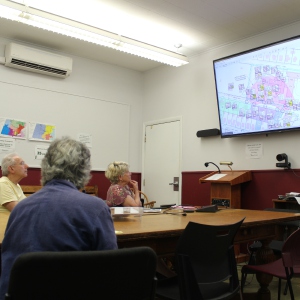My Turn: Solidarity is how movements win out

STAFF FILE PHOTO STAFF FILE PHOTO
| Published: 02-20-2025 8:35 AM |
At a moment of apparent tectonic shift in global and national power, those opposing the direction of that shift may find themselves rummaging through the historical record for some perspective on what is possible now. Some can’t help but recall the rise and fall of empires and civilizations that pursued unsustainable expansion, or even the deeper history of glaciations and moving continents that put all human affairs into perspective.
Many might find hope in the story of American progress — its gradual inclusion of Native Americans, women and former slaves as (partly) democratic citizens, and its belated attention to environmental concerns. Some have enough faith in that story to see the workings of the American political system as the most (or only) effective means to reverse the direction of change. But to be “all in” with a political party cuts off alternative possibilities.
Some may take solace in the fact that authoritarian movements often shoot themselves in the foot and collapse under their own contradictions. One response to what seems good or bad news can simply be “we’ll see.” We can’t know in advance the effectiveness of any course, but not knowing also allows us to consider alternatives.
Others, like me, oppose the direction of our apparent shift, but still agree that a fundamental shift is necessary — a shift that uncompromisingly confronts the power of concentrated wealth that is making Earth uninhabitable and opponents expendable. Unfortunately, both Democrats and Republicans of the U.S. political center have a history of supporting and protecting this concentrated power.
Change in the U.S. has often come by dint of independent movements such as abolition, suffrage, civil rights, gay rights, and women’s rights, that do not need to compromise preemptively.
A movement can decide strategically to support, or not support, a party without giving up its voice. A movement can directly oppose the political center of gravity because it has one foot firmly anchored beyond shifting political arrangements.
Every established order, including the American one, resists fundamental change. But every order also produces winners and losers. The Missouri Compromise of 1850 allowed slavery to spread westward, avoiding a rift between the two most powerful political forces in the United States. But to enslaved people, what value was this peace among white people? Losers have no part in the compromise, except to pay the price. They don’t decide.
Article continues after...
Yesterday's Most Read Articles
 Franklin Tech student from Orange found shot, killed in NH
Franklin Tech student from Orange found shot, killed in NH
 After 36 years with department, Montague police chief to retire
After 36 years with department, Montague police chief to retire
 Tests show flow of contamination from former Lunt Silversmiths site in Greenfield
Tests show flow of contamination from former Lunt Silversmiths site in Greenfield
 PHOTOS: Green River Festival wraps up 39th year
PHOTOS: Green River Festival wraps up 39th year
 Community Action project to create all-in-one service center, food pantry in Greenfield faces funding hurdles
Community Action project to create all-in-one service center, food pantry in Greenfield faces funding hurdles
 Small group, big impact: Volunteers form community in Greenfield while removing invasive plants
Small group, big impact: Volunteers form community in Greenfield while removing invasive plants
In order to legitimatize the obviously unjust treatment of losers, does one have to believe, or pretend to believe, that the USA is an exceptionally virtuous nation with a divinely ordained destiny to expand its power continuously? Is this story so precious that it trumps everything else?
The Roman Republic died when Julius Caesar crossed the Rubicon. Caesar promised Pax Romana (peace through total capitulation to the empire). This created an enduring stability that produced both winners and losers. The luxury of Rome’s patrician class required repression of any resistance from the empire’s losers.
One of these who resisted was Jesus of Nazareth, who defied the legitimacy of Rome’s demand for total capitulation. They tortured and executed him.
The empire must not be “too nice” to those who disrupt its peace. Repression works to undermine resistance through direct violence but also by co-opting people to do the empire’s work — people like King Herod who preserved his limited power by submitting to imperial orders.
How many Americans today would side with a rebel who resisted the center of power in his time? Who sided with the powerless? Who told the story of a Samaritan who helped a wounded man on the road?
But now we are hearing again the claim that dominance is the path to peace and prosperity. Perhaps the Samaritan should have put “Samaria first” and kicked that wounded traveler in the teeth. What empire can abide such a dangerous storyteller when it depends on division to maintain its power? In the words of Bob Dylan in “Idiot Wind”:
There’s a lone soldier on the cross
Smoke pouring out of a boxcar door
You didn’t know it
You didn’t think it could be done
In the final end he won the war
After losing every battle.
A movement requires persistence and also storytellers. But to be effective, it cannot rely on “lone soldiers,” magical thinking, miracles, or even short-term success. Its power lies in the people whose outrage awakens solidarity and resistance.
Torture works on the lone body. Solidarity disrupts isolation and undermines the divisions that support concentrated power. Solidarity is therefore the central target of repression. A movement is not powerless, but it will lose battles.
Patrick McGreevy Lives in Greenfield and welcomes comments its at pmcgreevy64@gmail.com.






 My Turn: Our generation’s ‘rendezvous with destiny’
My Turn: Our generation’s ‘rendezvous with destiny’ Tom Tolg: Regime change
Tom Tolg: Regime change Kathe Geist: Foreign students
Kathe Geist: Foreign students Tom Peabody: Trump fulfilling promises
Tom Peabody: Trump fulfilling promises
